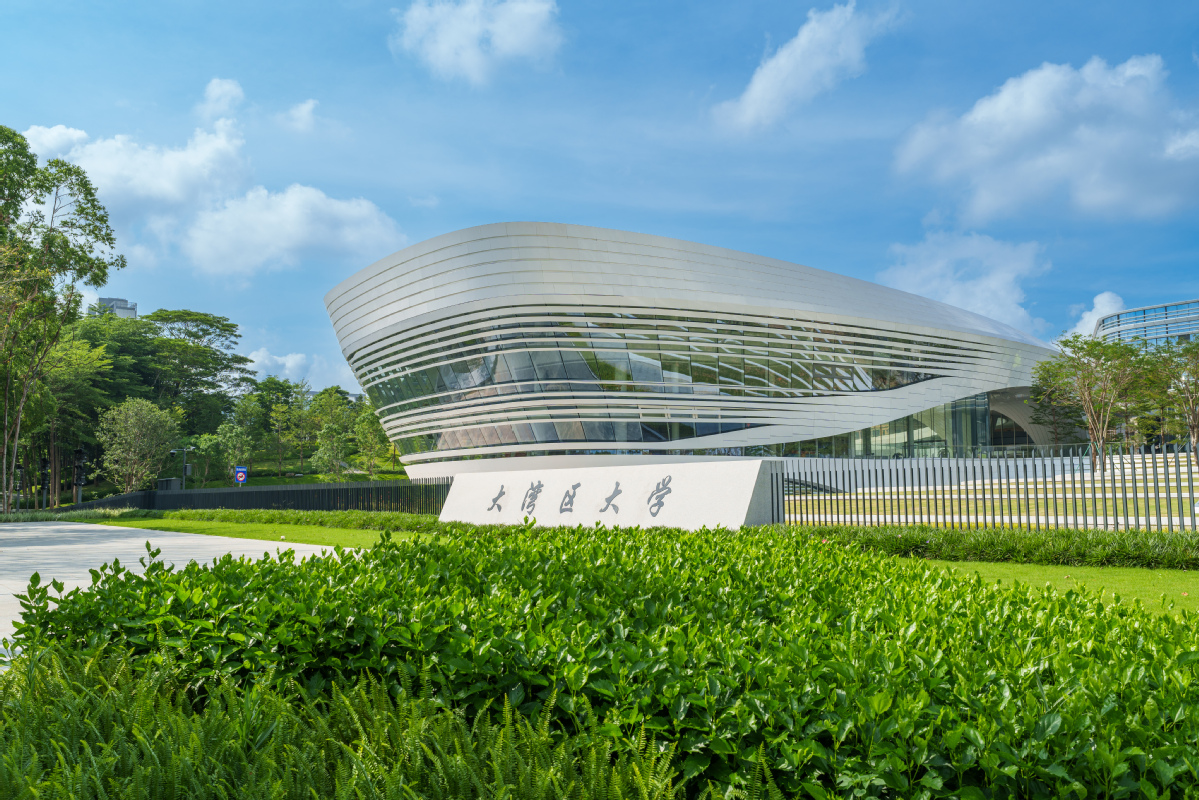
Three newly established research universities in China have drawn top-tier students in their inaugural undergraduate admissions, with their enrollees' scores on the national college entrance exam, or gaokao, rivaling or even surpassing those required by the nation's most prestigious institutions.
The Fuyao University of Science and Technology in Fujian province; the Eastern Institute of Technology, Ningbo in Zhejiang province; and Great Bay University in Dongguan, Guangdong province, have all reported remarkably high admission thresholds in their first year of enrollment.
At Fuyao, for example, the minimum gaokao score that physics majors from the Guangxi Zhuang autonomous region — one of five provincial-level regions that the university enrolls students from — is 616, surpassing those of established universities such as Beijing Normal University and Xiamen University.
Similar trends were seen in Jiangxi and Hunan provinces. The maximum possible gaokao score students can enroll with is 750 in most regions.
The Eastern Institute of Technology, Ningbo, which only admits students from Zhejiang province, set its minimum entrance score at 656 — exceeding those of many renowned universities. Great Bay University, with just 80 students admitted in Guangdong province, reported a minimum threshold of 622, only six points lower than Sun Yat-sen University and equal to that of the South China University of Technology.
Each institution offers unique advantages.
Privately funded Fuyao was founded by entrepreneur and philanthropist Cao Dewang with an investment of more than 10 billion yuan ($1.4 billion). It is led by Wang Shuguo, former president of Xi'an Jiaotong University, and enrolled just 50 students from five provincial-level regions.
Its appeal lies in its leadership, its elite faculty — which includes 15 members of the Chinese Academy of Sciences or Chinese Academy of Engineering — an accelerated bachelor-master-doctorate program that allows a student to earn a doctorate by age 26, and dual-degree options with overseas partners such as Oxford and Cambridge universities in the United Kingdom. Graduates also receive employment priority at Fuyao Glass Industry Group with a guaranteed minimum salary.
ALSO READ: China to add 23 vocational universities
The Eastern Institute of Technology, Ningbo, was launched with a donation from Will Semiconductor Chairman Yu Renrong and is headed by Chen Shiyi, former president of the Southern University of Science and Technology. It is offering effectively free tuition via full scholarships for its first cohort of 70 students in Zhejiang. The school focuses on computer science disciplines tied to artificial intelligence and chip development, and features one-on-one mentorship and 16 academicians on its faculty.

Publicly funded Great Bay University, led by renowned mathematician Tian Gang, enrolled 80 students in Guangdong and offers a 3-to-1 student-faculty ratio. Its programs are designed to align with the industrial strengths of the Guangdong-Hong Kong-Macao Greater Bay Area.
Education experts said these new research universities stand out for their high starting points, substantial investment, small-scale elite enrollment and strong research orientation.
Students and parents are increasingly looking beyond the prestige of traditional universities, instead considering factors such as academic majors, innovative teaching models, faculty credentials, postgraduation pathways and opportunities tied to the schools' locations in economically dynamic coastal regions.
For a high school graduate surnamed Huang from Hunan province, who scored 636 on the gaokao, Fuyao was his top choice.
Describing himself as a "young gambler" and a "guinea pig" for educational reform, Huang told Red Star News he was drawn to the school's leadership, its emphasis on integrating research and production, and its learning environment.
He acknowledged concerns that choosing a new university might "waste" his high score, but said he accepted the risks.
"If I win the gamble, I could become an associate professor in my 20s. If I lose, I could be a blue-collar worker at Fuyao Glass, earning a living with my own hands," he said. "I can accept both outcomes."
Ding Changfa, an associate professor of economics at Xiamen University, told financial media outlet Yicai that these universities attract top gaokao scorers by offering exceptional faculty, programs tailored to national economic priorities and promising career prospects in cutting-edge disciplines.
He noted that the schools' small enrollment sizes and specialized disciplines allow them to efficiently deploy resources to meet the demands of socioeconomic development.
Chu Zhaohui, a researcher at the China National Academy of Educational Sciences, told China Daily that evolving student preferences are reshaping the development of universities, with student quality forming the foundation of institutional excellence. Still, he cautioned that preferences alone do not guarantee long-term success.
READ MORE: China universities recognized in global science, tech rankings
Xiong Bingqi, director of the 21st Century Education Research Institute, said an increasing number of high-achieving students are prioritizing personal interests, strengths and career goals over school name recognition.
He emphasized that to maintain their appeal, new universities must prove their value through strong educational quality, distinctive features and graduate outcomes.


